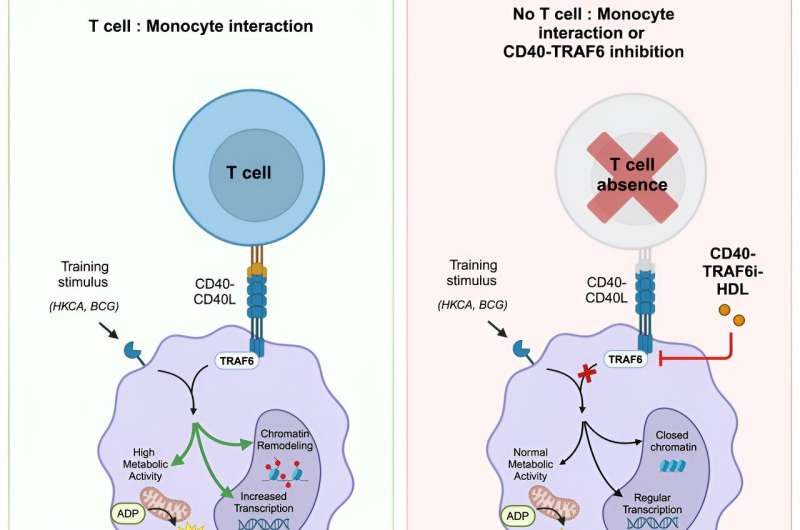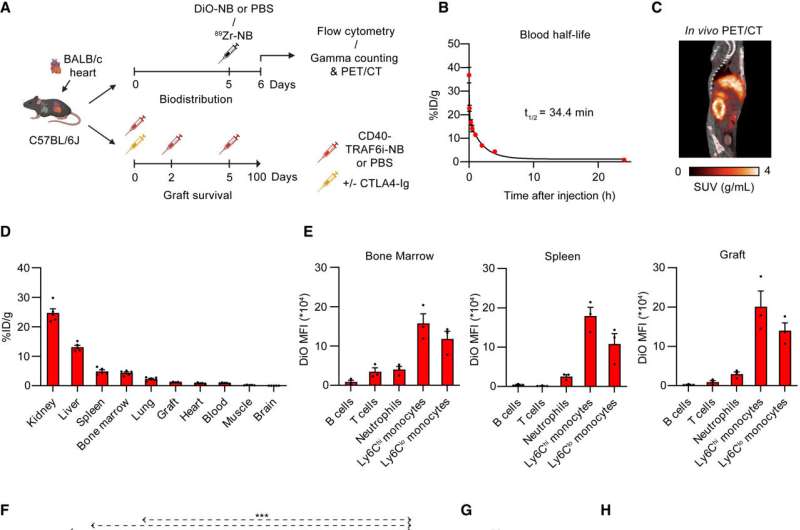This article has been reviewed according to Science X's editorial process and policies. Editors have highlighted the following attributes while ensuring the content's credibility:
fact-checked
peer-reviewed publication
trusted source
proofread
T cells can manipulate the memory of innate immune cells, researchers show

Research from Radboud university medical center reveals that T cells from the adaptive immune system can manipulate the memory of innate immune cells. Previously, it was believed that the memory of innate immune cells operated independently.
This surprising connection opens up new possibilities for the treatment of various diseases. A mouse model shows that no immunosuppressive drugs are needed after an organ transplantation if this interaction between T cells and the innate immunity is temporarily blocked after the transplantation. The article was published in Cell Reports.
The adaptive immune system develops through infections that people experience. This immune response is slow to develop, highly specific against pathogens, and uses memory cells. In addition, there is the innate immune system, which responds much faster to invaders and serves as a first line of defense.
About ten years ago, it was discovered that the cells of the innate system also have memory, allowing them to respond stronger and faster to repeated infections. This is called trained immunity.
Until now, trained immunity was thought to be an independent process of innate immune cells. However, research from an international team led by Raphaël Duivenvoorden and researcher Maaike Jacobs from Radboudumc has now revealed that T cells from the adaptive immune system play a crucial role in regulating trained immunity. They discovered that this occurs through direct contact between cells via the CD40 molecule.
Transplantation
This finding offers new possibilities for the treatment of various conditions where trained immunity plays a role, such as autoimmune disorders, cancer, cardiovascular diseases, and organ transplantation. The researchers demonstrated in a mouse model that a transplanted heart is accepted by the recipient for a long time when the interaction between T cells and the innate immune system is briefly blocked after the transplantation.

In this model, the researchers used nanoparticles with drugs incorporated that inhibit the CD40 signal. They combined three injections of these nanoparticles with a single injection of the existing drug CTLA4-Ig during the first week after the heart transplantation. This led to long-term acceptance of the transplanted heart, with no further need for other immunosuppressive drugs.
Memory
The fact that the innate immune system has memory is vital for the body's defense. However, sometimes the innate immune system is overactive, such as in autoimmune diseases, cardiovascular diseases, and during organ transplants, and this memory can have harmful effects. Understanding the molecular mechanisms behind this memory is therefore essential for developing new treatments.
This research shows that manipulating the memory of the innate immune system has potential as a new therapeutic strategy in organ transplantation. Duivenvoorden concludes, "In the coming years, we will continue this research with the aim of making this treatment strategy possible in humans."
More information: Trained immunity is regulated by T cell-induced CD40-TRAF6 signaling, Cell Reports (2024). DOI: 10.1016/j.celrep.2024.114664. www.cell.com/cell-reports/full … 2211-1247(24)01015-5





















